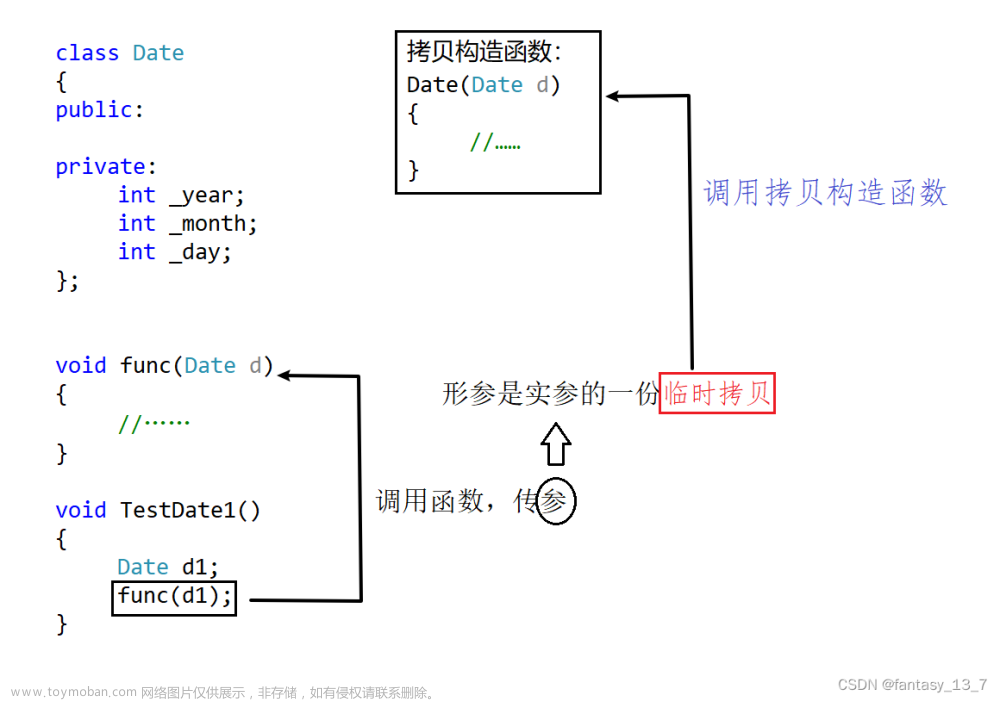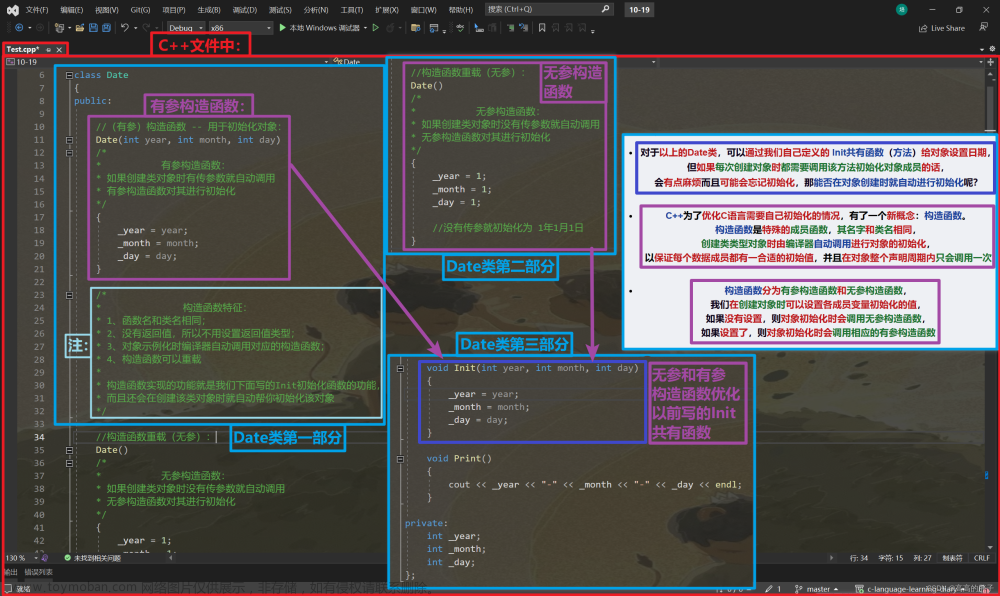目录
日期类型
Date.h
Date.cpp
Test.cpp
实现Cout运算符重载
实现Cin运算符重载
根据日期算星期
修改后完整代码
Date.h
Date.cpp
const成员
取地址及const取地址操作符重载
习题 计算日期到天数转换
日期类型
Date.h

#include<iostream>
using namespace std;
class Date
{
public:
// 获取某年某月的天数
int GetMonthDay(int year, int month)
{
static int days[13] = { 0, 31, 28, 31, 30, 31, 30, 31, 31, 30, 31, 30, 31 };
int day = days[month];
if (month == 2
&& ((year % 4 == 0 && year % 100 != 0) || (year % 400 == 0)))
{
day += 1;
}
return day;
}
Date(int year = 1900, int month = 1, int day = 1)
{
_year = year;
_month = month;
_day = day;
}
void Print();
bool operator==(const Date& d);
bool operator!=(const Date& d);
bool operator>(const Date& d);
bool operator<(const Date& d);
bool operator>=(const Date& d);
bool operator<=(const Date& d);
Date operator+(int day);
Date& operator++();//默认是前置++,返回+完后的值,用引用返回
Date operator++(int i);//后前置++,里面要写一个参数,这里的参数可以不用形参接收,括号里直接写int就行,但加了参数也无所谓,这里的参数只是为了区分
//C++为了区分前后置++,使用重载进行区分,后置++重载增加一个int参数跟前置构成函数重载进行区分
Date& operator+=(int day);
Date operator-(int day);
Date& operator-= (int day);
Date& operator--();
Date operator--(int);
int operator-(const Date& d);
private:
int _year;
int _month;
int _day;
};
Date.cpp
#include"date.h"
bool Date::operator==(const Date& d)
{
return _year == d._year &&
_month == d._month &&
_day == d._day;
}
bool Date::operator!=(const Date& d)
{
return !(*this == d);
}
bool Date::operator>(const Date& d)
{
if (_year > d._year)
return true;
else if (_year == d._year && _month > d._month)
{
return true;
}
else if (_year == d._year && _month == d._month && _day > d._day)
{
return true;
}
else
return false;
}
bool Date::operator<(const Date& d)
{
return !(*this >= d);
}
bool Date::operator>=(const Date& d)
{
return (*this > d) || (*this == d);
}
bool Date::operator<=(const Date& d)
{
return !(*this > d);
}
// 自身要改变
Date& Date::operator+=(int day)
{
_day += day;
while (_day > GetMonthDay(_year, _month))
{
_day -= GetMonthDay(_year, _month);
_month++;
if (_month == 13)
{
_month = 1;
_year ++;
}
}
return *this;
}
//自身不改变
Date Date::operator+(int day)
{
Date ret(*this);//拷贝构造
//Date ret= *this;在这里,这条语句是拷贝构造,拿*this初始化ret,已经存在的对线才是赋值
ret += day;
return ret;//传值返回的时候,会生成一份拷贝
}
void Date::Print()
{
cout << _year<<"/" << _month<<"/"<<_day << endl;
}
Date& Date::operator++()//前置
{
*this += 1;
return *this;
}
Date Date::operator++(int)//后置,返回++之前的值
{
Date tmp(*this);
*this += 1;
return tmp;
}
Date& Date::operator-= (int day)
{
_day -= day;
while (_day <= 0)
{
--_month;
if (_month == 0)
{
--_year;
_month = 12;
}
_day += GetMonthDay(_year,_month);
}
return *this;
}
Date Date::operator-(int day)
{
Date ret = *this;
ret -= day;
return ret;
}
Date& Date::operator--()//前置--
{
*this -= 1;
return *this;
}
Date Date::operator--(int)//后置--
{
Date tmp = *this;
*this -= 1;
return tmp;
}
int Date::operator-(const Date& d)//日期相减
{
int flag = 1;
Date max = *this;
Date min = d;
if (*this < d)
{
min = *this;
max = d;
flag = -1;
}
int n = 0;
while (min != max)
{
++min;
++n;
}
return n*flag;
}
Test.cpp
int main()
{
Date d1(2001, 1, 3);
Date d2(2023, 7, 23);
Date d3(2022, 6, 23);
cout << (d1 < d2) << endl;
cout << (d1 > d2) << endl;
cout << (d1 == d2) << endl;
cout << (d1 < d3) << endl;
cout << (d1 > d3) << endl;
cout << (d1 == d3) << endl;
Date ret1 = d1 + 100;
ret1.Print();
Date ret2=++d1;//转换为d1.operator++(&d1)
ret2.Print();
Date ret3=d2++;//转换为d1.operator++(&d2,0)
ret3.Print();
d1 += 100;
d1.Print();
d1 -= 100;
d1.Print();
Date ret4 = d1 - 1000;
ret4.Print();
int ret5 = d1 - d2;
cout << ret5 << endl;
return 0;
} 
一个类到底可以重载哪些运算符,要看哪些运算符对这个类型有意义
日期减天数思路:先给天减,如果不够(<=0)就借位
程序有缺陷,构造这里出现了问题
我们在类里面加上判断日期的函数即可或者用assert去判
Date(int year = 1900, int month = 1, int day = 1) { _year = year; _month = month; _day = day; //assert(CheckDate()); if (!CheckDate()) { Print(); cout << "日期非法" << endl; } } bool CheckDate() { if (_year >= 1 && _month < 13 && _month>0 && _day > 0 && _day <= GetMonthDay(_year, _month)) return true; else return false; }

加一个负数会报错,我们只需在+=里面进行调整就行,因为+是通过+=实现的
Date& Date::operator+=(int day) { if (day < 0) { return *this -= -day; } _day += day; while (_day > GetMonthDay(_year, _month)) { _day -= GetMonthDay(_year, _month); _month++; if (_month == 13) { _month = 1; _year ++; } } return *this; }
同理对-=也修改,如果天数小于0,-=之后 会因为负负得正,给加几天,我们此时调整一下即可
实现Cout运算符重载
C++ cout和cin能自动识别的原因:
1.库里面写好了运算符重载
2.自动识别类型,它们构成重载函数
运算符重载:让自定义类型对象可以用运算符,转换成调用这个重载函数
函数重载:支持函数名相同的函数同时存在
虽然俩者都是重载,但它们俩者没有关系
但如果这样使用cout和cin会报错
此时我们自己在类里面写运算重载符就可以解决这个问题
cout是ostream类型对象,cin是istream类型对象
void Date::operator<<(ostream& out) { out << _year << "-" << _month << _day; }此时如果写成这个样子,还是会报错
但这样可以
运算符有多个操作数的时候,第一个参数是左操作数,第二个参数是右操作数
d1是第一个操作数(左操作数),cout是第二个操作数 (右操作数)
cout<<d1转换为cout.operatpr(d1),所以会报错
若想通过cout<<d1来打印,则不能修改上面的运算符重载,因为类对象抢占了第一个数,默认是this,所以无法通过修改运算符重载来实现该语句
此时把该运算符重载写到外面,当作一个函数,不能当成员函数使用,out就会是第一个操作数
但会有一个缺陷,私有变量无法访问
这里可以通过友元进行修改
此时就可以访问这些私有成员
但此时这样写又会不支持
这里需要返回值,返回值就是cout,这样才能连续的插入
此时可正常打印
这个函数可能会被频繁调用,可能输出多行,因此搞成内联函数最好
但是此时声明在.h定义在.cpp,声明和定义分离,链接时报错
直接在.h里面定义好就行
实现Cin运算符重载
cin是istream类型对象,流提取,cout不需要改变Date,但Cin需要改变Date
因为这是要从流里面提取出年月日参数,放到日期里面
但此时输入非法日期不报错
此时在加个判断
根据日期算星期
以1年1月1日星期六为参考对象,输入一个日期后,俩日期相减,然后对7取模就行
0相当于周天,1-5对应周一到周六
void DateSwap() { const char* WeekDayToStr[] = { "周一","周二","周三","周四","周五","周六","周日" }; Date d1; Date start(1, 1, 1); cout << "请输入日期"; cin >> d1; int n = d1 - start; int weekDay = 0; weekDay += n; cout << WeekDayToStr[ weekDay % 7] << endl; }
修改后完整代码
Date.h
#include<iostream>
#include<assert.h>
using namespace std;
class Date
{
friend ostream& operator<<(ostream& out, const Date& d);
friend istream& operator>>(istream& in, Date& d);
public:
// 获取某年某月的天数
int GetMonthDay(int year, int month)
{
static int days[13] = { 0, 31, 28, 31, 30, 31, 30, 31, 31, 30, 31, 30, 31 };
int day = days[month];
if (month == 2
&& ((year % 4 == 0 && year % 100 != 0) || (year % 400 == 0)))
{
day += 1;
}
return day;
}
Date(int year = 1900, int month = 1, int day = 1)
{
_year = year;
_month = month;
_day = day;
if (!CheckDate())
{
Print();
cout << "日期非法" << endl;
}
}
bool CheckDate()
{
if (_year >= 1 && _month < 13 && _month>0 && _day > 0 && _day <= GetMonthDay(_year, _month))
return true;
else
return false;
}
void Print();
bool operator==(const Date& d);
bool operator!=(const Date& d);
bool operator>(const Date& d);
bool operator<(const Date& d);
bool operator>=(const Date& d);
bool operator<=(const Date& d);
Date operator+(int day);
Date& operator++();//默认是前置++,返回+完后的值,用引用返回
Date operator++(int i);//后前置++,里面要写一个参数,这里的参数可以不用形参接收,括号里直接写int就行,但加了参数也无所谓,这里的参数只是为了区分
//C++为了区分前后置++,使用重载进行区分,后置++重载增加一个int参数跟前置构成函数重载进行区分
Date& operator+=(int day);
Date operator-(int day);
Date& operator-= (int day);
Date& operator--();
Date operator--(int);
int operator-(const Date& d);
private:
int _year;
int _month;
int _day;
};
inline ostream& operator<<(ostream& out, const Date& d)
{
out << d._year <<"年" << d._month<< "月" << d._day<<"日" << endl;
return out;
}
inline istream& operator>>(istream & in, Date & d)
{
assert(d.CheckDate());
in >> d._year >> d._month >> d._day;
return in;
}
void DateSwap();Date.cpp
#include"date.h"
bool Date::operator==(const Date& d)
{
return _year == d._year &&
_month == d._month &&
_day == d._day;
}
bool Date::operator!=(const Date& d)
{
return !(*this == d);
}
bool Date::operator>(const Date& d)
{
if (_year > d._year)
return true;
else if (_year == d._year && _month > d._month)
{
return true;
}
else if (_year == d._year && _month == d._month && _day > d._day)
{
return true;
}
else
return false;
}
bool Date::operator<(const Date& d)
{
return !(*this >= d);
}
bool Date::operator>=(const Date& d)
{
return (*this > d) || (*this == d);
}
bool Date::operator<=(const Date& d)
{
return !(*this > d);
}
// 自身要改变
Date& Date::operator+=(int day)
{
if (day < 0)
{
return *this -= -day;
}
_day += day;
while (_day > GetMonthDay(_year, _month))
{
_day -= GetMonthDay(_year, _month);
_month++;
if (_month == 13)
{
_month = 1;
_year ++;
}
}
return *this;
}
//自身不改变
Date Date::operator+(int day)
{
Date ret(*this);//拷贝构造
//Date ret= *this;在这里,这条语句是拷贝构造,拿*this初始化ret,已经存在的对线才是赋值
ret += day;
return ret;//传值返回的时候,会生成一份拷贝
}
void Date::Print()
{
cout << _year<<"/" << _month<<"/"<<_day << endl;
}
Date& Date::operator++()//前置
{
*this += 1;
return *this;
}
Date Date::operator++(int)//后置,返回++之前的值
{
Date tmp(*this);
*this += 1;
return tmp;
}
Date& Date::operator-= (int day)
{
if (day < 0)
{
return *this += -day;
}
_day -= day;
while (_day <= 0)
{
--_month;
if (_month == 0)
{
--_year;
_month = 12;
}
_day += GetMonthDay(_year,_month);
}
return *this;
}
Date Date::operator-(int day)
{
Date ret = *this;
ret -= day;
return ret;
}
Date& Date::operator--()//前置--
{
*this -= 1;
return *this;
}
Date Date::operator--(int)//后置--
{
Date tmp = *this;
*this -= 1;
return tmp;
}
int Date::operator-(const Date& d)//日期相减
{
int flag = 1;
Date max = *this;
Date min = d;
if (*this < d)
{
min = *this;
max = d;
flag = -1;
}
int n = 0;
while (min != max)
{
++min;
++n;
}
return n*flag;
}
void DateSwap()
{
const char* WeekDayToStr[] = { "周一","周二","周三","周四","周五","周六","周日" };
Date d1;
Date start(1, 1, 1);
cout << "请输入日期";
cin >> d1;
int n = d1 - start;
int weekDay = 0;
weekDay += n;
cout << WeekDayToStr[ weekDay % 7] << endl;
}
//void Date::operator<<(ostream& out)
//{
// out << _year << "-" << _month <<"-" << _day;
//}
const成员
这种情况下会报错 ,会把const Date转换为Date
这是因为this指针在传参的时候是这样的
参数里的const修饰this指针本身
d1.Print();传参的时候是将d1的地址传过去,&d1,类型是Date*
d2.Print();&d2 传不过去,因为传过去的是const Date*类型,而形参是Date*类型
d1<d2可以,d2<d1不可以
d1<d2,d1是Date *可以传过去
d2<d1,d2是const Date *不能传给this,所以会报错
如果要改变这种错误,就要给this加上const,Date *const this变为const Date *const this
把const加在这个位置
但是对于d1,本来是Date *const this变为了const Date *const this 把权限缩小了,这样d1就不能给赋值了
取地址及const取地址操作符重载
权限可以缩小,平移,不能放大
这里可以写俩个Print,构成函数重载
编译器在调用的时候会自动匹配,当取地址情况下需要它们同时存在
Date* operator&() { return this; } const Date* operator&()const { return this; }一个返回Date *,一个返回const Date *
调用相对应的
如果不写编译器会自动生成
这两个运算符一般不需要重载,使用编译器生成的默认取地址的重载即可,只有特殊情况,才需要重载,比如想让别人获取到指定的内容
如果不想让别人取地址,一般自己写一个,返回nullptr即可
习题 计算日期到天数转换
计算日期到天数转换__牛客网 (nowcoder.com)文章来源:https://www.toymoban.com/news/detail-412528.html
文章来源地址https://www.toymoban.com/news/detail-412528.html
#include <iostream> using namespace std; int main(){ int year,month,day; cin>>year>>month>>day; int monthDays[13]={0,31,59,90,120,151,181,212,243,273,304,334,365}; int n=monthDays[month-1]+day; if(month>2&&((year%4==0&&year%100!=0)||(year%400==0))) n+=1; cout<<n<<endl; return 0; }
到了这里,关于C++——类和对象3|日期类型|Cout运算符重载|Cin运算符重载|const成员|的文章就介绍完了。如果您还想了解更多内容,请在右上角搜索TOY模板网以前的文章或继续浏览下面的相关文章,希望大家以后多多支持TOY模板网!

















































